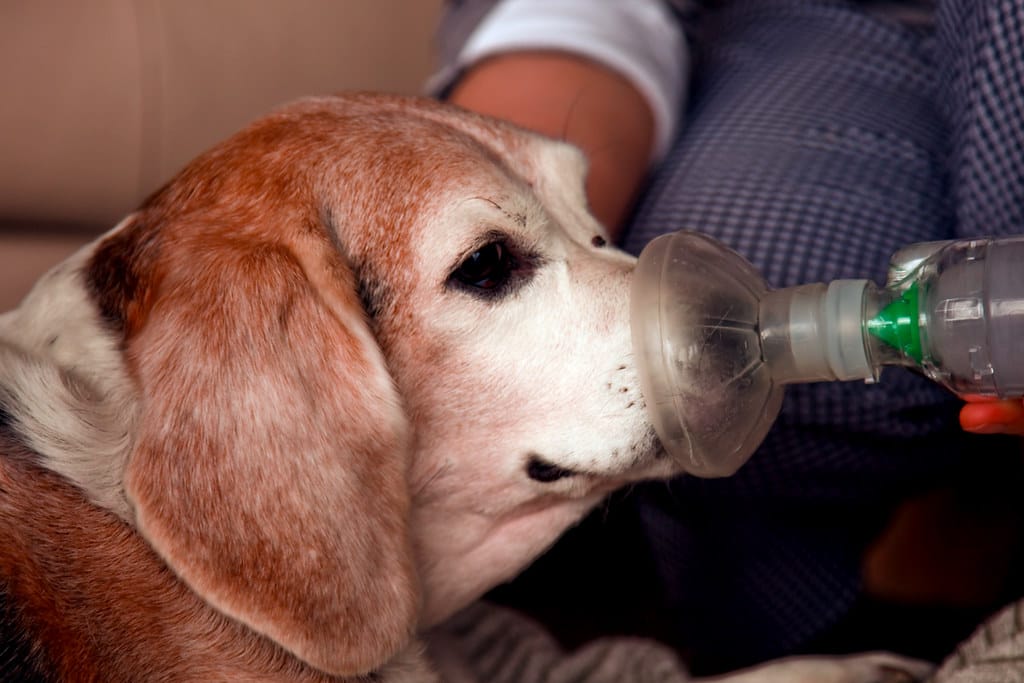Dogs are known to suffer from various respiratory problems, such as coughing, sneezing, and shortness of breath. However, one question that often arises is whether dogs can have asthma. The answer is yes, dogs can have asthma, but it is not as common as it is in humans.

Asthma is a chronic respiratory disease that causes inflammation and narrowing of the airways. It can be triggered by various allergens, such as pollen, mold, cigarette smoke, and cleaning products. In dogs, asthma is also known as allergic bronchitis and causes the lower airways to thicken and fill with mucus because of exposure to an allergen or irritant.
The symptoms of asthma in dogs are similar to those in humans, including coughing, wheezing, shortness of breath, and difficulty breathing. However, it is important to note that not all dogs with respiratory problems have asthma, and a proper diagnosis is necessary to determine the underlying cause of the symptoms. If you suspect that your dog may have asthma, it is important to consult with a veterinarian to determine the best course of treatment.

Understanding Asthma in Dogs
Defining Asthma
Asthma is a chronic respiratory disease that affects the airways of the lungs, leading to difficulty in breathing. In dogs, asthma is also known as allergic bronchitis, bronchial asthma, or chronic bronchitis. It is characterized by recurring attacks of wheezing, coughing, and difficulty in breathing, which can be triggered by exposure to certain allergens or irritants.

Causes of Asthma in Dogs
The exact cause of asthma in dogs is not fully understood. However, it is believed that dogs with a genetic predisposition to allergies may be more susceptible to developing asthma. Exposure to environmental allergens such as pollen, dust mites, and mold spores can also trigger asthma attacks in dogs. Other potential triggers include smoke, air pollution, and certain medications.
Prevalence in Canine Populations
Asthma is a relatively uncommon condition in dogs, with only a small percentage of the canine population affected. Certain breeds, such as Terriers and Poodles, may be more prone to developing asthma than others. Age can also be a factor, with asthma typically developing in middle-aged or older dogs.
It is important to note that while dogs can develop asthma, the condition is not contagious and cannot be passed on to other animals or humans. If you suspect that your dog may be suffering from asthma, it is important to seek veterinary care to properly diagnose and treat the condition. With proper management and care, many dogs with asthma can lead happy and healthy lives.
Asthma in dogs can be a serious condition that requires immediate attention from a veterinarian. Here are some of the symptoms of canine asthma that pet owners should be aware of.
Recognizing Asthmatic Signs
One of the most common symptoms of canine asthma is coughing. Dogs with asthma may cough frequently, especially after exercise or when they are excited. The cough may be dry and hacking, or it may be accompanied by mucus.

Another sign of canine asthma is difficulty breathing. Dogs with asthma may breathe rapidly or have shallow breaths. They may also wheeze or make a whistling sound when they breathe.
Differentiating from Other Respiratory Issues
It is important to note that not all coughing or difficulty breathing in dogs is due to asthma. Other respiratory issues, such as kennel cough or heart disease, can cause similar symptoms.
If a dog is experiencing any of the symptoms mentioned above, it is important to take them to a veterinarian for a proper diagnosis. The veterinarian may perform tests such as X-rays or blood work to determine the cause of the symptoms.
In conclusion, recognizing the symptoms of canine asthma is crucial for pet owners to ensure their dog receives the proper care and treatment. If you suspect your dog may have asthma, it is important to seek veterinary care as soon as possible.
Diagnosing Asthma in Dogs
Veterinary Diagnostic Procedures
Diagnosing asthma in dogs can be challenging due to similar symptoms to other respiratory diseases. However, there are several veterinary diagnostic procedures that can help identify the condition. These may include:
- Physical Examination: A veterinarian will perform a physical examination of the dog to check for any signs of respiratory distress such as coughing, wheezing, or difficulty breathing.
- Chest X-rays: X-rays can help detect any abnormalities in the lungs, such as inflammation or thickening of the airways.
- Bronchoscopy: This procedure involves inserting a flexible tube with a camera into the dog's airways to visually inspect them for any abnormalities.
- Blood Tests: Blood tests can help identify any underlying allergies or infections that may be contributing to the dog's respiratory symptoms.
Interpreting Test Results
Interpreting test results is a crucial step in diagnosing asthma in dogs. A veterinarian will consider the dog's symptoms, physical exam findings, and test results to make an accurate diagnosis. Some common findings in dogs with asthma include:
- Inflammation and thickening of the airways
- Increased mucus production
- Narrowing of the airways
- Coughing and wheezing
It is important to note that other respiratory diseases can also cause similar symptoms, so a thorough evaluation is necessary to rule out other conditions. Once a diagnosis of asthma is made, appropriate treatment can be initiated to manage the dog's symptoms and improve their quality of life.
Treatment Options
Medications and Inhalers
There are a variety of medications and inhalers that can help manage asthma symptoms in dogs. These medications work by reducing inflammation in the airways, which helps to open them up and make breathing easier. Some common medications used to treat asthma in dogs include:
- Corticosteroids: These drugs are used to reduce inflammation and swelling in the airways. They can be given orally or via an inhaler.
- Bronchodilators: These drugs work by relaxing the muscles in the airways, making it easier for the dog to breathe. They can be given orally or via an inhaler.
- Antihistamines: These drugs can help to reduce the allergic response that triggers asthma symptoms in some dogs.
Inhalers can be especially effective for treating asthma in dogs. They deliver medication directly to the airways, where it is needed most. Some common inhalers used to treat asthma in dogs include:
- Metered-dose inhalers (MDIs): These inhalers deliver a measured dose of medication with each puff. They are often used with a spacer device to help ensure that the medication reaches the lungs.
- Dry powder inhalers (DPIs): These inhalers deliver a dry powder medication that is activated by the dog's inhalation. They do not require a spacer device.
Lifestyle and Environmental Changes
In addition to medication, there are several lifestyle and environmental changes that can help manage asthma symptoms in dogs. These changes include:
- Reducing exposure to allergens: If the dog's asthma is triggered by allergens such as pollen or dust, it may be helpful to reduce their exposure to these substances. This can be done by using air filters in the home, washing bedding and toys regularly, and avoiding outdoor activities during peak pollen season.
- Maintaining a healthy weight: Obesity can make asthma symptoms worse in dogs, so it is important to maintain a healthy weight through diet and exercise.
- Avoiding smoke: Smoke from cigarettes, candles, or fires can irritate the airways and trigger asthma symptoms in some dogs. Avoiding exposure to smoke can help manage symptoms.
- Managing stress: Stress can make asthma symptoms worse in some dogs. Providing a calm and stable environment, regular exercise, and positive reinforcement training can help reduce stress levels and manage symptoms.
Overall, a combination of medication and lifestyle changes is often the most effective approach to managing asthma in dogs. With prompt diagnosis and appropriate treatment, many dogs with asthma are able to live normal, active lives.

Asthma in dogs can be a challenging condition to manage, but with the right approach, it can be controlled and your furry friend can lead a happy and healthy life. There are two main aspects to managing asthma in dogs: emergency care for asthma attacks and long-term management strategies.
Emergency Care for Asthma Attacks
Asthma attacks can be scary for both you and your dog, but there are steps you can take to help your pet breathe easier. If your dog is having an asthma attack, remain calm and take the following actions:
- Move your dog to an area with fresh air.
- Administer any prescribed medication as directed by your veterinarian.
- Encourage your dog to take slow, deep breaths.
- Monitor your dog's breathing and heart rate.
- Seek veterinary care if your dog's condition does not improve or worsens.
Long-Term Management Strategies
Long-term management of asthma in dogs is essential to prevent future asthma attacks and improve your dog's quality of life. Here are some strategies to consider:
- Work with your veterinarian to develop a treatment plan that includes medications to manage inflammation and open airways.
- Keep your dog away from known triggers such as cigarette smoke, dust, and pollen.
- Use air purifiers and keep your home clean to reduce exposure to allergens.
- Monitor your dog's breathing and keep a record of any changes or symptoms.
- Consider alternative therapies such as acupuncture or herbal remedies, but only under the guidance of a qualified veterinarian.
Remember, managing asthma in dogs is an ongoing process that requires patience and dedication. With the right care and attention, your dog can live a happy and healthy life despite their asthma diagnosis.
Prevention and Care
Reducing Asthma Triggers
Reducing asthma triggers in a dog's environment can help prevent asthma attacks. Some common triggers include pollen, mold spores, dust, smoke, and pet dander. Pet owners can take the following steps to reduce these triggers:
- Keep the house clean by vacuuming regularly and dusting surfaces.
- Use air purifiers or air filters to remove allergens from the air.
- Wash the dog's bedding and toys regularly.
- Avoid smoking around the dog.
- Use fragrance-free cleaning products.

Regular Veterinary Check-Ups
Regular check-ups with a veterinarian can help ensure that a dog with asthma is receiving proper care and treatment. The veterinarian can monitor the dog's symptoms and adjust the treatment plan as necessary. The following are some steps that a veterinarian may take to help manage a dog's asthma:
- Prescribe medication to manage inflammation and reduce airway constriction.
- Recommend lifestyle changes, such as weight loss or exercise modifications.
- Monitor the dog's breathing and lung function.
- Provide education on how to recognize and respond to asthma attacks.
By taking these steps, pet owners can help prevent asthma attacks and manage the symptoms of asthma in their dogs. It is important to work closely with a veterinarian to develop a treatment plan that is tailored to the individual needs of the dog.
Case Studies and Research
Documented Cases of Canine Asthma
While asthma is commonly associated with humans, it is also a condition that affects dogs. Documented cases of canine asthma have been reported, with symptoms including coughing, wheezing, and difficulty breathing. These symptoms can be triggered by various factors, such as allergens, exercise, stress, and infections.
One case study involved a 7-year-old male neutered Pomeranian who had been experiencing coughing and wheezing for several months. The dog was diagnosed with asthma based on bronchoscopic findings and response to treatment with corticosteroids and bronchodilators. Another case study involved a 5-year-old male neutered Bichon Frise who had been experiencing coughing and exercise intolerance for several weeks. The dog was diagnosed with asthma based on radiographic and bronchoscopic findings and response to treatment with corticosteroids and bronchodilators.
Ongoing Research and Findings
While there is still much to learn about canine asthma, ongoing research has provided some insights into the condition. For example, a study published in the Journal of Allergy and Clinical Immunology found that exposure to dogs during infancy may reduce the risk of developing asthma later in life. The study followed a group of children from birth to age 18 and found that those who had been exposed to dogs during their first year of life had a lower risk of developing asthma compared to those who had not been exposed to dogs.
Another study published in the Journal of Veterinary Internal Medicine found that dogs with chronic bronchitis (a condition similar to asthma) had higher levels of certain inflammatory markers in their airways compared to healthy dogs. This suggests that inflammation may play a role in the development and progression of canine asthma.
Overall, while more research is needed to fully understand canine asthma, the documented cases and ongoing research provide valuable insights into the condition and potential treatments.
Conclusion
In conclusion, asthma in dogs, while less common than in humans, is a significant health concern that requires careful attention and management. Known as allergic bronchitis, this condition involves inflammation and narrowing of the airways, which can severely impact a dog's quality of life. Symptoms such as coughing, wheezing, and difficulty breathing necessitate prompt veterinary diagnosis and treatment.
Management strategies including avoiding allergens, maintaining a healthy weight, and using appropriate medications are crucial in controlling asthma in dogs. With vigilant care and regular veterinary consultations, dogs with asthma can lead active and comfortable lives. Owners should remain informed and proactive in recognizing and managing this condition to ensure their pets' well-being.






